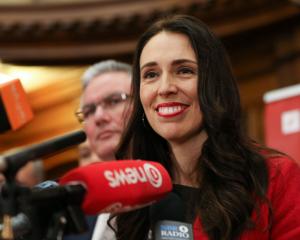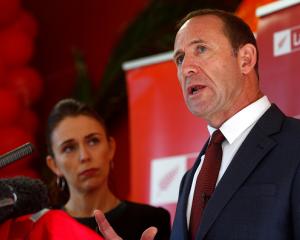On the face of it, Labour would seem deserving of much applause for rule changes which now make the election of the party's leader a far better exercise in democracy.
Changes to the party's constitution which give every party member a say on whether David Cunliffe, Shane Jones or Grant Robertson should be handed the difficult task of returning Labour to the Promised Land has surely got to be a good thing, hasn't it?
Or is it? There is a long forgotten, but still very solid reason why the election of the leader was the sole preserve of Labour's MPs for so long.
MPs are hostage to the fortunes (good and bad) of their leader more than anyone else in the party. It can be argued that deciding who ends up in the job should remain the prerogative of MPs, and theirs alone.
The net impact of the recent rule changes could instead see someone - Mr Cunliffe to be precise - whom caucus members might regard as being inflicted upon them as leader by misguided outsiders. The caucus, or at least the majority of its members, might thus not feel obliged to take ''ownership'' of the new leader.
The consequences - a flood of MPs announcing retirement might be one outcome - can only be guessed but are unlikely to be positive.
Similar reservations apply to the new rules which proscribe how MPs deal with a leader who no longer enjoys their confidence.
It has gone completely unnoticed that the clause in the new rules approved amidst much acrimony at last year's party conference and dealing with the removal of a leader were short-circuited by the caucus in David Shearer's case.
And with very good reason. Mr Shearer was strongly urged by colleagues to resign rather than - as stated in the new rules - face a caucus motion which if passed by the requisite numbers - 50% of the party's MPs plus one - would have triggered a leadership election once party president Moira Coatsworth had been notified.
That Mr Shearer went quickly and quietly was a blessing not just for him, but for the caucus and the party.
The alternatives do not bear thinking about. What if it had proved difficult to get sufficient numbers to pass the required motion?
Worse, imagine the paralysis which would have struck the party had Mr Shearer done a Helen Clark and dug in his toes and reserved his right to fight the election triggered by that motion.
Had Mr Shearer not played ball, Labour might have found itself embroiled in a very ugly and very divisive four-way tussle over the leadership which, because of the complicated new method of electing the leader, would have lasted a minimum of three weeks.
Imagine what would happen if Mr Cunliffe becomes leader, that leadership turns into a disaster, but Mr Cunliffe refuses to go and there has to be a caucus motion to force an election.
Mr Shearer would have lost that election. However, in Mr Cunliffe's case, the party might revolt against the caucus and reinstall him as leader to the caucus's horror. Unlikely, but not impossible.
Regardless, the new rules have been symptomatic of an increasingly toxic relationship between the bulk of the caucus and factions within the wider party.
Things have not been helped by Mr Shearer's scuttling of the so-called ''man ban'' which would have opened the door to women-only candidate selections - and which Mr Cunliffe has not ruled out reinstating.
Those tensions boiled over at last year's conference - and will likely do so again if Mr Cunliffe misses out on the leadership, especially if he has the backing of a significant a majority of the 40% segment of the overall vote determining the leader which has been allocated to the several thousand paid-up party members.
Unfortunately for party unity, Mr Cunliffe's legendary unpopularity in the Labour caucus is thought to have handed Mr Robertson, Labour's deputy leader and Wellington Central MP, the support of about 22 of the party's 34 MPs.
That would give Mr Robertson a substantial chunk of the 40% of the leadership-determining total vote allocated to the caucus - and correspondingly reduce the share of the membership vote Mr Robertson would need to win over to become leader.
The other 20% of the ''electoral college'' vote is held by trade unions affiliated to the party.
Fearful that National will seek to portray the new leader as a puppet of the unions, Labour's supreme body, the national council, has banned block voting by the affiliates and stipulated that their ballots be conducted at delegate or member level.
It would be surprising if Mr Robertson did not pick up a fair measure of support from this quarter, thereby upping the pressure on Mr Cunliffe to win even more of the share reserved for rank-and-file members.
Many party activists back Mr Cunliffe partly because they see him as the only candidate who can galvanise wavering voters into ending their infatuation with John Key and returning en masse to Labour.
Mr Cunliffe is also being touted as some kind of heir-apparent to the iconic figures of Labour's past and thus someone capable of resurrecting and revitalising Labour's long-dormant left-wing tradition.
This personal transformation has been greeted with both astonishment and scepticism in what might be termed the ''Wellington [Robertson] Beltway'' element of the party who assumed Mr Cunliffe was far more at home on the party's right.
Having instead cleverly positioned himself on the party's left which is underrepresented by senior MPs, Mr Cunliffe and his supporters are seeking to make his campaign an unstoppable force which makes it impossible for him to be denied the leadership for a second time and which will thus force MPs and union affiliates to shift their support away from Mr Robertson.
In Parliament, with the outgoing leader on leave, his deputy consumed with getting the top job and the rest of the caucus viewing the race with trepidation, Labour drifts leaderless and rudderless for two weeks. Labour is the Mary Celeste of Parliament.
John Armstrong is The New Zealand Herald political correspondent.










